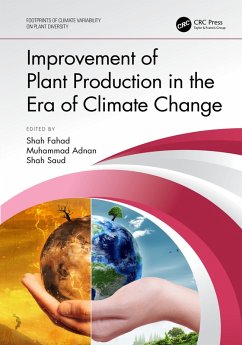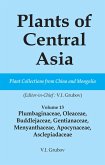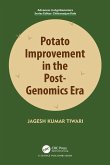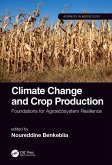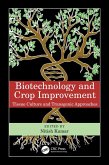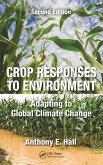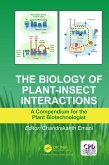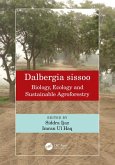Improvement of Plant Production in the Era of Climate Change (eBook, ePUB)
Redaktion: Fahad, Shah; Saud, Shah; Adnan, Muhammad
54,95 €
54,95 €
inkl. MwSt.
Sofort per Download lieferbar

27 °P sammeln
54,95 €
Als Download kaufen

54,95 €
inkl. MwSt.
Sofort per Download lieferbar

27 °P sammeln
Jetzt verschenken
Alle Infos zum eBook verschenken
54,95 €
inkl. MwSt.
Sofort per Download lieferbar
Alle Infos zum eBook verschenken

27 °P sammeln
Improvement of Plant Production in the Era of Climate Change (eBook, ePUB)
Redaktion: Fahad, Shah; Saud, Shah; Adnan, Muhammad
- Format: ePub
- Merkliste
- Auf die Merkliste
- Bewerten Bewerten
- Teilen
- Produkt teilen
- Produkterinnerung
- Produkterinnerung

Bitte loggen Sie sich zunächst in Ihr Kundenkonto ein oder registrieren Sie sich bei
bücher.de, um das eBook-Abo tolino select nutzen zu können.
Hier können Sie sich einloggen
Hier können Sie sich einloggen
Sie sind bereits eingeloggt. Klicken Sie auf 2. tolino select Abo, um fortzufahren.

Bitte loggen Sie sich zunächst in Ihr Kundenkonto ein oder registrieren Sie sich bei bücher.de, um das eBook-Abo tolino select nutzen zu können.
This book provides a guide to the latest development of the most advanced, helps in the understanding of plant response to abiotic stress, leading to new horizons and the strategy for the current translation studies application overall solution to create a powerful production and crop improvement in such an adverse environment.
- Geräte: eReader
- mit Kopierschutz
- eBook Hilfe
Andere Kunden interessierten sich auch für
![Plants of Central Asia - Plant Collection from China and Mongolia Vol. 13 (eBook, ePUB) Plants of Central Asia - Plant Collection from China and Mongolia Vol. 13 (eBook, ePUB)]() Plants of Central Asia - Plant Collection from China and Mongolia Vol. 13 (eBook, ePUB)61,95 €
Plants of Central Asia - Plant Collection from China and Mongolia Vol. 13 (eBook, ePUB)61,95 €![Potato Improvement in the Post-Genomics Era (eBook, ePUB) Potato Improvement in the Post-Genomics Era (eBook, ePUB)]() Jagesh TiwariPotato Improvement in the Post-Genomics Era (eBook, ePUB)55,95 €
Jagesh TiwariPotato Improvement in the Post-Genomics Era (eBook, ePUB)55,95 €![Climate Change and Crop Production (eBook, ePUB) Climate Change and Crop Production (eBook, ePUB)]() Climate Change and Crop Production (eBook, ePUB)69,95 €
Climate Change and Crop Production (eBook, ePUB)69,95 €![Biotechnology and Crop Improvement (eBook, ePUB) Biotechnology and Crop Improvement (eBook, ePUB)]() Biotechnology and Crop Improvement (eBook, ePUB)52,95 €
Biotechnology and Crop Improvement (eBook, ePUB)52,95 €![Crop Responses to Environment (eBook, ePUB) Crop Responses to Environment (eBook, ePUB)]() Anthony E. HallCrop Responses to Environment (eBook, ePUB)47,95 €
Anthony E. HallCrop Responses to Environment (eBook, ePUB)47,95 €![The Biology of Plant-Insect Interactions (eBook, ePUB) The Biology of Plant-Insect Interactions (eBook, ePUB)]() The Biology of Plant-Insect Interactions (eBook, ePUB)47,95 €
The Biology of Plant-Insect Interactions (eBook, ePUB)47,95 €![Dalbergia sissoo (eBook, ePUB) Dalbergia sissoo (eBook, ePUB)]() Dalbergia sissoo (eBook, ePUB)52,95 €
Dalbergia sissoo (eBook, ePUB)52,95 €-
-
-
This book provides a guide to the latest development of the most advanced, helps in the understanding of plant response to abiotic stress, leading to new horizons and the strategy for the current translation studies application overall solution to create a powerful production and crop improvement in such an adverse environment.
Dieser Download kann aus rechtlichen Gründen nur mit Rechnungsadresse in A, B, BG, CY, CZ, D, DK, EW, E, FIN, F, GR, HR, H, IRL, I, LT, L, LR, M, NL, PL, P, R, S, SLO, SK ausgeliefert werden.
Produktdetails
- Produktdetails
- Verlag: Taylor & Francis eBooks
- Seitenzahl: 292
- Erscheinungstermin: 20. Juli 2022
- Englisch
- ISBN-13: 9781000610857
- Artikelnr.: 64106173
- Verlag: Taylor & Francis eBooks
- Seitenzahl: 292
- Erscheinungstermin: 20. Juli 2022
- Englisch
- ISBN-13: 9781000610857
- Artikelnr.: 64106173
- Herstellerkennzeichnung Die Herstellerinformationen sind derzeit nicht verfügbar.
Dr. Shah Fahad is a Professor in the Hainan Key Laboratory for Sustainable Utilization of Tropical Bioresource, College of Tropical Crops, Hainan University, Haikou, China. He obtained his PhD in Agronomy from Huazhong Agriculture University, China, in 2015. After doing his postdoctoral research in Agronomy at the Huazhong Agriculture University (2015-17), he accepted the position of Assistant Professor at the University of Haripur. He has published over 332 peer-reviewed papers (Impact factor 1050.18) with more than 300 research and 32 review articles, on important aspects of climate change, plant physiology and breeding, plant nutrition, plant stress responses and tolerance mechanisms, and exogenous chemical priming-induced abiotic stress tolerance. He has also contributed 58 book chapters to various book editions published by Springer, Wiley-Blackwell, and Elsevier. He has edited eighteen book volumes, including this one, published by CRC press, Springer, and Intech Open. He won Young Rice International Scientist award, Distinguish scholar award and Top young investigator award in 2014, 2015 and 2019 respectively. He won 15 projects from international and national donor agencies. Dr. Shah Fahad name figured twice among the top two percent scientists in a global list compiled by the Stanford University, USA. He has worked and is presently continuing on a wide range of topics, including climate change, greenhouse emission gasses, abiotic stresses tolerance, roles of phytohormones and their interactions in abiotic stress responses, heavy metals, regulation of nutrient transport processes. Dr. Muhammad Adnan is a lecturer in the Department of Agriculture at the University of Swabi (UOS), Pakistan. He has completed his PhD (soil fertility and microbiology) from the Department of Soil and Environmental Sciences (SES) the University of Agriculture Peshawar, Pakistan and Department of Plant, Soil and Microbial Sciences, Michigan State University, USA. He has received his MSc and BSc (Hons) in Soil and Environmental Sciences, from Department of SES the University of Agriculture, Peshawar-Pakistan. Dr. Shah Saud is currently working as an Assistant Professor in the College of Life Science, Linyi University, Linyi, China. He received his Ph.D. in Turf grasses (Horticulture) from Northeast Agricultural University, Harbin, China. He is currently working as a Post Doctorate researcher in department of Horticulture, Northeast Agricultural University, and Harbin, China. Dr. Shah Saud has published over 125 research publications in peer-reviewed journals. He has edited five books and written 35 book chapters on important aspects of plant physiology, plant stress responses, and environmental problems in relation to agricultural plants. According to Scopus®, Dr. Shah Saud's publications have received roughly 3000 citations with an h-index of 34.
1. Adaptations in Cropping System and Pattern for Sustainable Crops
Production under Climate Change Scenarios. 2. Extreme Low Temperature and
Plant Life. 3. Heat-Induced Oxidative Stress in Plants: Consequences and
Survival Mechanisms. 4. The Incidence of Heat Stress on the Quality of Food
Crops in the Era of the Changing Climate: An Overview. 5. Climate Change
and Cotton Production. 6. Effect of Climate Change on Cereal Crops. 7.
Abiotic Stress in Plants and Metabolic Responses. 8. Reactive Oxygen
Species and Antioxidants Defence in Plants Under Hostile Environment. 9.
Global Change Implications on Oxidative Status in Photosynthetic Organisms.
10. Postharvest Sucrose Losses under Water Stress Conditions in Sugarcane.
11. Legume Production and Climate Change. 12. Plant-Insect Interaction:
Plant Defence Barrier vs Counter Defence Mechanism of Insects
Production under Climate Change Scenarios. 2. Extreme Low Temperature and
Plant Life. 3. Heat-Induced Oxidative Stress in Plants: Consequences and
Survival Mechanisms. 4. The Incidence of Heat Stress on the Quality of Food
Crops in the Era of the Changing Climate: An Overview. 5. Climate Change
and Cotton Production. 6. Effect of Climate Change on Cereal Crops. 7.
Abiotic Stress in Plants and Metabolic Responses. 8. Reactive Oxygen
Species and Antioxidants Defence in Plants Under Hostile Environment. 9.
Global Change Implications on Oxidative Status in Photosynthetic Organisms.
10. Postharvest Sucrose Losses under Water Stress Conditions in Sugarcane.
11. Legume Production and Climate Change. 12. Plant-Insect Interaction:
Plant Defence Barrier vs Counter Defence Mechanism of Insects
1. Adaptations in Cropping System and Pattern for Sustainable Crops
Production under Climate Change Scenarios. 2. Extreme Low Temperature and
Plant Life. 3. Heat-Induced Oxidative Stress in Plants: Consequences and
Survival Mechanisms. 4. The Incidence of Heat Stress on the Quality of Food
Crops in the Era of the Changing Climate: An Overview. 5. Climate Change
and Cotton Production. 6. Effect of Climate Change on Cereal Crops. 7.
Abiotic Stress in Plants and Metabolic Responses. 8. Reactive Oxygen
Species and Antioxidants Defence in Plants Under Hostile Environment. 9.
Global Change Implications on Oxidative Status in Photosynthetic Organisms.
10. Postharvest Sucrose Losses under Water Stress Conditions in Sugarcane.
11. Legume Production and Climate Change. 12. Plant-Insect Interaction:
Plant Defence Barrier vs Counter Defence Mechanism of Insects
Production under Climate Change Scenarios. 2. Extreme Low Temperature and
Plant Life. 3. Heat-Induced Oxidative Stress in Plants: Consequences and
Survival Mechanisms. 4. The Incidence of Heat Stress on the Quality of Food
Crops in the Era of the Changing Climate: An Overview. 5. Climate Change
and Cotton Production. 6. Effect of Climate Change on Cereal Crops. 7.
Abiotic Stress in Plants and Metabolic Responses. 8. Reactive Oxygen
Species and Antioxidants Defence in Plants Under Hostile Environment. 9.
Global Change Implications on Oxidative Status in Photosynthetic Organisms.
10. Postharvest Sucrose Losses under Water Stress Conditions in Sugarcane.
11. Legume Production and Climate Change. 12. Plant-Insect Interaction:
Plant Defence Barrier vs Counter Defence Mechanism of Insects
